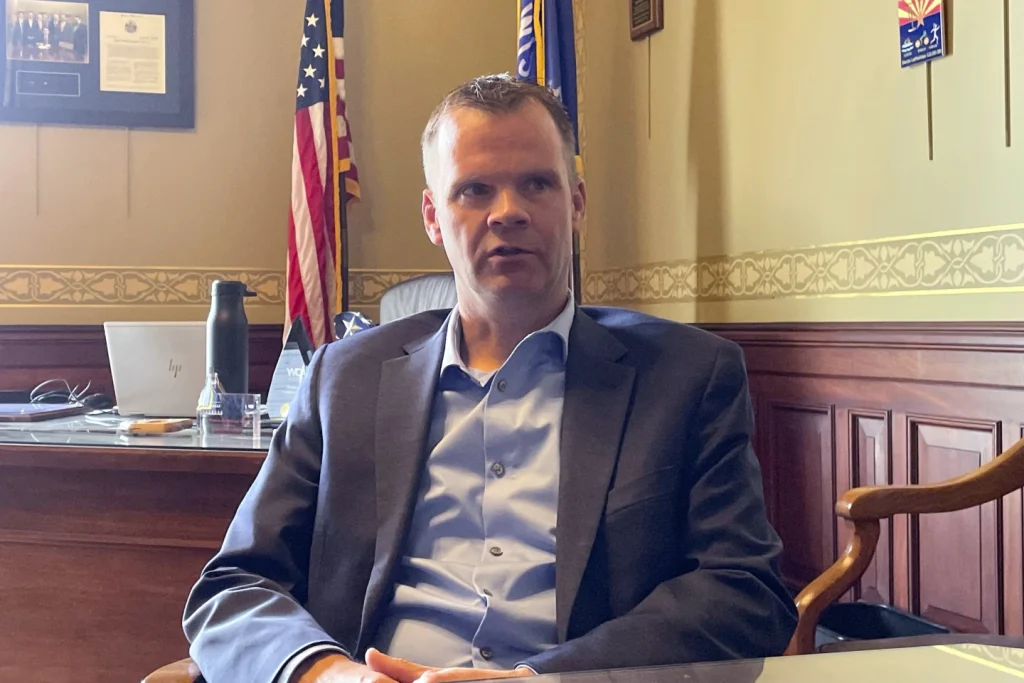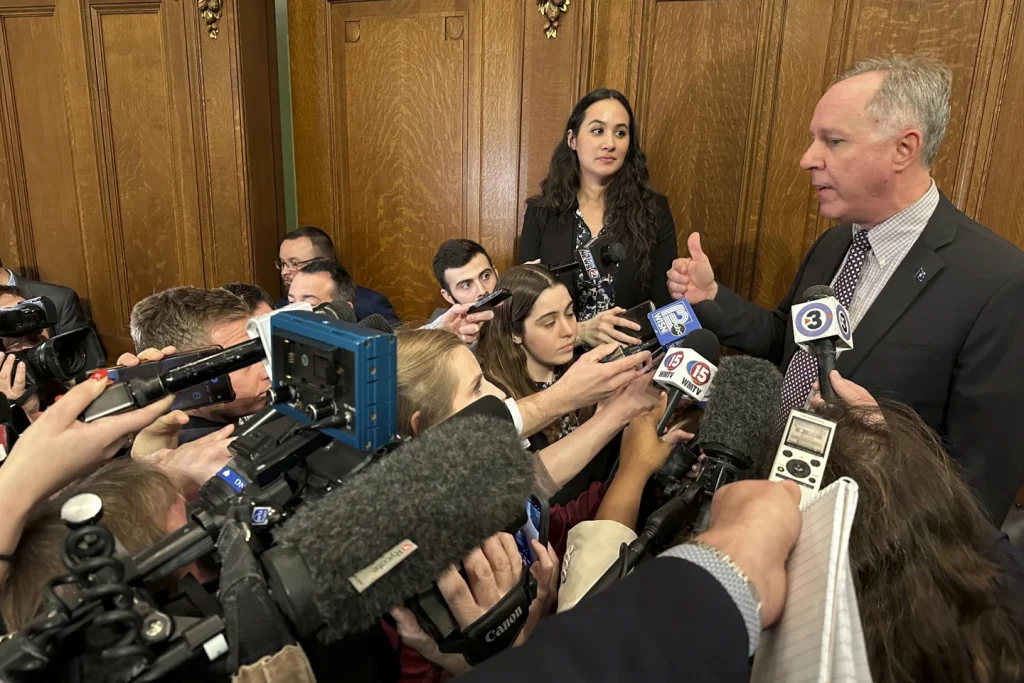In a dramatic turn of events, Wisconsin Republicans undertook a last-minute endeavor on Tuesday to circumvent the imposition of new legislative district boundaries for the upcoming November election by the liberal-controlled state Supreme Court.
The Republican-dominated Senate swiftly approved new Senate and Assembly maps barely an hour after their unveiling, leaving no opportunity for public scrutiny or Democratic input prior to their release.
Democrats expressed dismay, asserting that they were not afforded sufficient time to thoroughly evaluate the proposal before the vote.
Meanwhile, Assembly Republicans deliberated over the possibility of endorsing maps as proposed by Democratic Governor Tony Evers without any alterations, a move that could potentially preclude the Wisconsin Supreme Court from mandating boundaries that may prove even more disadvantageous for the Republican party.
The unfolding developments have ignited fervent debate and raised concerns about the integrity and fairness of the electoral process in Wisconsin, prompting widespread speculation about the potential ramifications of these eleventh-hour maneuvers on the state’s political landscape.
The recent events surrounding the redistricting process in Wisconsin have sparked intense debate and controversy, shedding light on the intricate dynamics of power, partisanship, and the quest for fairness in the realm of politics.
The statements made by key political figures, including Governor Tony Evers, Republican Assembly Speaker Robin Vos, and various spokespersons, underscore the deep-seated tensions and strategic maneuvers that characterize the redistricting process.
This essay aims to delve into the multifaceted implications of the ongoing redistricting saga in Wisconsin, examining the underlying motivations, the clash of ideologies, and the potential ramifications for the state’s political landscape.
At the heart of the matter lies the fundamental question of fairness and equity in the delineation of electoral boundaries.
Governor Evers’ assertion that the governor’s map was a “partisan attack” reflects a sentiment shared by many who perceive the redistricting efforts as a strategic ploy to tip the scales in favor of one political party.
Conversely, the response from Republican leaders, such as Senator Devin LeMahieu and Assembly Speaker Robin Vos, underscores the complex interplay of political interests and the pursuit of advantageous electoral outcomes.
The divergent perspectives on what constitutes fairness and balance in redistricting highlight the deeply entrenched partisan divisions that permeate the political landscape.
The interplay between the executive and legislative branches further complicates the redistricting process. The divergence in opinions between Governor Evers and the Republican-controlled Legislature underscores the inherent power struggle and the strategic calculations at play.
The prospect of passing the maps as proposed by Evers, as supported by Speaker Vos, adds another layer of complexity to the situation.
The intricate dance of negotiation, power dynamics, and strategic positioning underscores the high-stakes nature of redistricting and its far-reaching implications for political power and representation.
Furthermore, the role of the Wisconsin Supreme Court in adjudicating the redistricting dispute introduces a judicial dimension to the already contentious process.
The court’s decision to order new maps following the invalidation of the current Republican-drawn district boundaries underscores the pivotal role of the judiciary in overseeing the fairness and constitutionality of electoral maps.
The impending release of new maps, coupled with the court’s deference to the Legislature if it can pass maps acceptable to Governor Evers, adds a layer of uncertainty and anticipation to the unfolding saga.
The rhetoric and accusations exchanged by representatives from both parties shed light on the deeply entrenched suspicions and accusations that underpin the redistricting process.
Governor Evers’ spokesperson’s assertion that the Republican maps are a blatant attempt to disenfranchise voters, juxtaposed with Senator LeMahieu’s warning that a gubernatorial veto would reveal the true intent of disenfranchisement, underscores the high-stakes nature of redistricting and the divergent narratives that shape the political discourse.
The implications of the redistricting saga extend beyond mere political maneuvering, encompassing broader questions of representation, fairness, and the integrity of the electoral process.
The potential impact on the balance of power in the Senate and Assembly, as highlighted by Democratic Senator Mark Spreitzer, underscores the far-reaching consequences of redistricting on the distribution of political power and the representation of diverse constituencies.
In conclusion, the ongoing redistricting saga in Wisconsin encapsulates the intricate interplay of power, partisanship, and the quest for fairness in the political arena.
The divergent perspectives, strategic calculations, and high-stakes maneuvering underscore the complexity and significance of the redistricting process.
As the state grapples with the task of redrawing electoral boundaries, the implications for political representation, power dynamics, and the integrity of the electoral process loom large, shaping the future trajectory of Wisconsin’s political landscape.
The recent passage of the bill by the Senate, with a vote of 17-14 and the noteworthy alignment of four Republicans and 10 Democrats against, marks a significant development in Wisconsin’s political landscape.

Anticipated shifts in Republican majorities, as outlined in the various maps under review by the Wisconsin Supreme Court, are poised to bring about substantial changes.
According to an analysis conducted by Marquette University Law School research fellow John D. Johnson, the proposed Evers map could potentially diminish the Republican majority in the Assembly from 29 seats to a mere seven-seat margin, while also reducing their Senate edge to just one seat.
Despite reassurances from LeMahieu that the proposed alterations would not impact the partisan composition of each district, the ongoing debate underscores the persistent efforts of Republicans to influence redistricting.
Notably, a previous attempt to wrest control of redistricting occurred in September, when the Assembly approved a comprehensive plan aiming to transfer map-drawing authority from lawmakers to nonpartisan staff.
Governor Evers, however, rebuffed the plan, denouncing it as “bogus,” despite its resemblance to a nonpartisan redistricting proposal he had long advocated for.
The recent Senate passage of the amended bill, just prior to Evers’ State of the State address, signals a pivotal moment in the ongoing redistricting saga.
